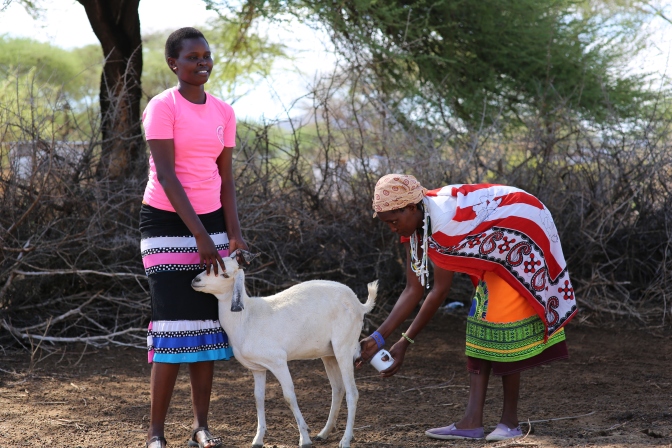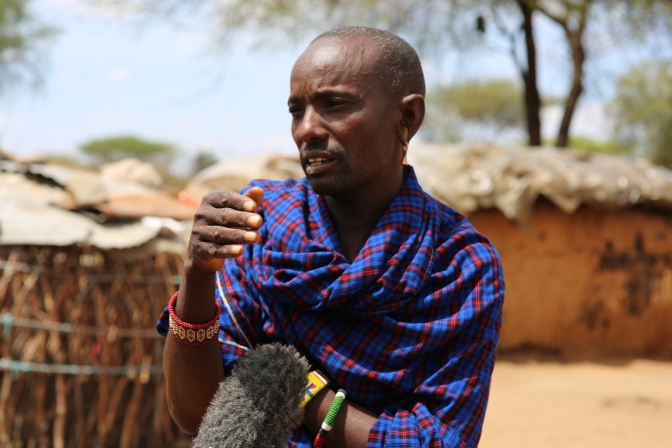By Dominic Kirui.
 Nadupoi helps restrain a goat as her mother, Angela Rampei milks it. [PHOTO/Dominic Kirui]
Nadupoi helps restrain a goat as her mother, Angela Rampei milks it. [PHOTO/Dominic Kirui]
Under the scorching heat of the mid-morning sun at Ilmotiok, a village in Kajiado, Southern Kenya, Angela Rampei, 42 is busy milking goats as her eldest daughter, Nadupoi, helps in restraining the goats by holding their ears.
Kenya’s Maasai, a pastoral community is known to depend on cattle for products such as milk and meat, but for the Rampei family, the case is different. Ndupoi’s father, Rampei Wuantai has sold all his cattle to take his children to school, defying the community’s culture in having her daughters undergo the cut, commonly referred to as Female Genital Mutilation or Cutting (FGM/C).
Nadupoi, a mother of one, is now a fourth form at a nearby local boarding high school. During her labour pain, none of the local birth attendants was willing to come to her aid, simply because she had not undergone the cut.
“I remember the very night; I sought for assistance in three homesteads but no one among my fellow women here was willing to soil their hands with the blood of an uncircumcised girl,” says Nadupoi’s mother.
Rampei underwent the cut when her grandmother, whom she was staying with insisted that she must fulfill the cultural demands, much as her parents were educated and was not practicing the vice.
“I was circumcised at the hospital, what many among our culture consider nothing, saying it’s as good as someone who has not been cut”, she says.
She continues to say that she has become an outcast among her fellow women, who severally have referred to her as being a fool because she doesn’t let her daughters be circumcised.
“They tell me that even if my husband does not let the girls undergo the cut, I should be the one arranging for that but I answer them that I cannot go against my husband’s orders”.
For Mrs. Rampei, FGM is largely contributed to by women. She says that in the Maasai community, the responsibility of raising a daughter is largely bestowed on the mother. Women are the ones who make significant decisions on whether a girl should be cut or not.
These women also are the ones who discriminate against the uncircumcised girls. A girl who is not circumcised among the Maasai is seen as a child and no one will one to associate with her among her age mates.
According to Bernadette Loloju, the CEO of the Anti-FGM Board, female genital cutting among the Maasai was done as a rite of passage for the girls so that they are ready for marriage. An uncircumcised girl would be referred to as ‘entito’, while one who has undergone this ‘rite’ is called ‘esiankiki’. The women themselves feel that they should go through the cut for them to be married.
Caroline Ncharo, an Assistant Chief for Lenkishon sub-location is busy teaching about 500 girls on the disadvantages of FGM at Canaan primary school during their school holidays and she says that the Maasai community has been ranked third in Africa and around the world for circumcising 84 percent of its women and girls. She says that fighting the vice is and still remains a great challenge.
Though considered criminal in Kenya and a human rights violation internationally, FGM continues to be practiced, not only in Kenya but also in most parts of the world. A recent study by UNICEF dubbed Female Genital Mutilation/Cutting: A Global Concern shows that at least 200 million women in 30 countries have been cut, and half of this are from tree countries; Ethiopia, Egypt and Indonesia. 44 million are girls under 14 years and younger.
“World Vision Kenya has facilitated community dialogue whereby we sit down with the local men and women, and discuss issues of FGM. The men say that the practice is spearheaded by women as they don’t even know where their girls are cut, all they do is give out money or livestock for the ceremony, and the women agree. If we bring women on board and talk with them, we shall face out FGM among the Maasai”, Ncharo says.
The Kenya Anti-FGM Board-established in December 2013 following the 2011 Act of Parliament-has spoken against the vice, terming it criminal and those convicted shall be liable to imprisonment for a term not less than six months, or to a fine of not less than fifty thousand shillings, or both.
The German international broadcaster, DW had earlier last year reported that the Maasai community wanted to retain the cut, claiming that it is their culture and a woman who do not undergo it lack authority later as a 14-year-old circumcised girl has much more authority than a woman at 60 who is not cut.
Muteti Mpaapai, a neighbour of the Rampeis says that female circumcision is a must do for the community. Speaking through a translator, Mpaapai said, “We must be allowed to cut girls and if not so, then the circumcision of boys should as well stop”.
 Mutetei Mpaapai is and ardent supporter of FGM and believes all Maaai Girls should undergo the cut [PHOTO/Dominic Kirui]
Mutetei Mpaapai is and ardent supporter of FGM and believes all Maaai Girls should undergo the cut [PHOTO/Dominic Kirui]
In July 2014, Public Radio International spoke to BBC’s Anne Soy who had just attended a meeting that was attended by over a thousand women from eight different clans belonging to the Maasai tribe in Kenya.
“They said that no one consulted them even when the country was coming up with laws that prohibited FGM, and so they felt that they were being discriminated against and they needed their voices heard,” Soy said.
Soy says that a majority of those who still want to practice FGM are the uneducated. They feel left out because representatives come from Nairobi to their villages and tell them that this has been decided on and they have to stop the practice and so they feel like they haven’t been consulted.
Two years ago, more than 500 women had been involved in a protest where they walked for 15 kilometers from Enkorika to Sijaloni in Kajiado Central asking the government to leave them alone so as to continue practicing FGM, which they said was their rich culture according to the local online publication, Standard Digital.
This was followed by a stern warning by the now Kenya’s Cabinet Secretary for Internal Security, (Rtd) Gen Joseph Nkaissery, who was then the area MP. “These people should be ready to go to jail if found practicing this culture that has been overtaken by events”, Gen Nkaissery had said.
The Anti-FGM Board Chairperson Hon. Linah Jebii Kilimo says that the Board had a session with the women immediately after the protests and the area Members of County Assembly who have formed a network of partners campaigning against FGM.
Hon. Kilimo says, “What drives the practice is the need for these women to have their daughters married as communities who practice it believe that one becomes a woman after the cut. I am personally from a community that cuts its girls and I was motivated by education and so we are bringing in mentorship both for girls and boys because if we reduce the demand, then the supply will also automatically reduce. If the men will say we will only marry uncircumcised ladies, then there will be no supply”.
However, most Maasai young men, commonly referred to as the ‘Moran’ have discouraged the practice saying that they would prefer marrying uncircumcised girls.
“I would personally not marry a circumcised girl since I have seen most of my friends abandoning their wives and going for girls from other tribes who do not cut their girls”, says Kennedy Lankoi, 23, who is Rampei’s firstborn son and works as a teacher at a local primary school after completing high school.